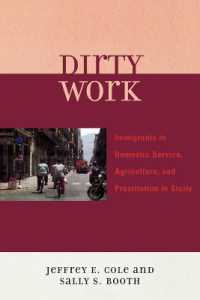Full Description
This book studies gender, sexuality, and representation in The Mahabharata. Drawing on Feminist theory, Queer theory and Deconstructivist theory, it revisits the epic as a saga of agency, empowerment, and subversion, and examines how it gives the gendered marginal — the women and the queer — a voice.
The authors argue that in a fluid text like The Mahabharata, there is ample scope for contradiction and conformation, as well as conflict and resolution, which gives the marginal an opportunity to document resistance. They analyse the stories of Draupadi, Kunti, Renuka, Ulupi, and Hidimba within an anti-patriarchal, non-normative, post-modern theoretical framework. They also examine liminal figures like Shikhandi, Yuvanashwa, Sudyumna and Bhangashwan, who are uniquely placed in conversation involving queer space, marginalization, and resistance.
An important addition to the study of Indian epics, this book will be indispensable for scholars and researchers of cultural studies, subaltern studies, Indian literature, English literature, gender studies, sexuality studies, queer studies, women's studies, exclusion studies, and postcolonial studies.
Contents
1. INTRODUCTION 2. THE CROCODILIAN FEMALES OF THE 'NARI TIRTHA' 3. RENUKA AND AHALYA WHO LUSTED AFTER OTHER MEN 4. THE WILD WOMEN OF THE MADRAKAS AND THE BALHIKAS 5. ULUPI, THE WARRIOR PRINCESS OF THE NAGAS 6. CHITRANGADA, THE ANDROGYNOUS QUEEN OF MANIPUR 7. HIDIMBA, THE DEMON-BRIDE OF BHIMA 8. YUVANASHWA, THE PREGNANT KING 9. SHIKHANDI, THE TRANSGENDER PRINCE OF PANCHALA 10. YOGINI SULABHA WHO CHALLENGED KING JANAKA 11. VIDULA, THE FIREBRAND QUEEN MOTHER 12. KUNTI: THE MOTHER OF KARNA 13. KRISHNAA' DRAUPADI: 'IN HER WILL RISE MANY FEARS!' 14. CONCLUSION








